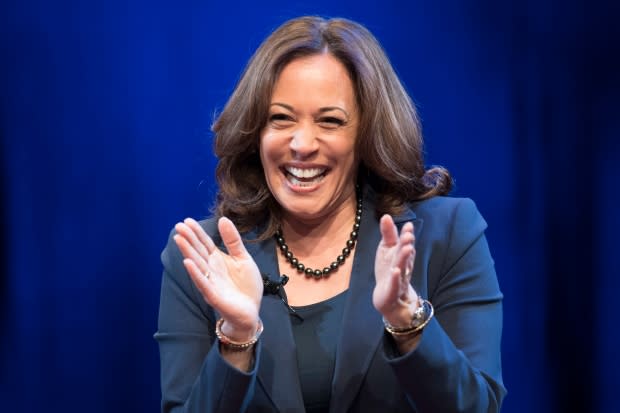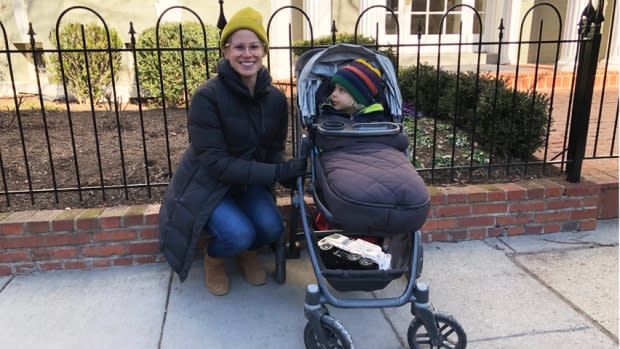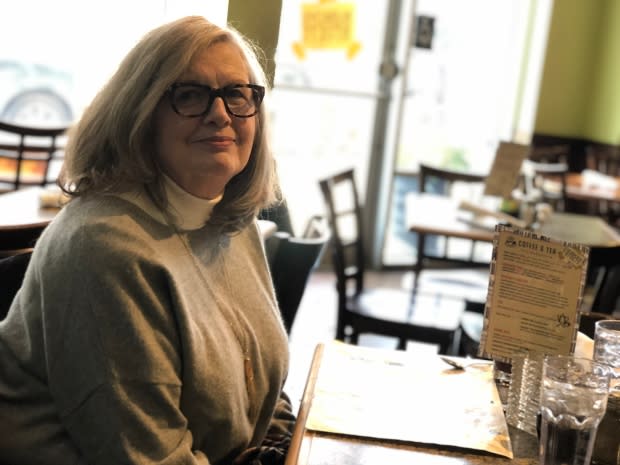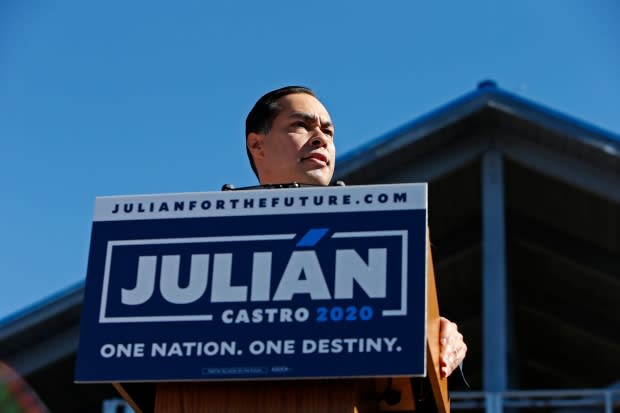Democrats hoping to run against Trump in 2020 suffer from lack of name recognition
Erin Katz knows precisely which Democratic candidate she wants to challenge U.S. President Donald Trump in 2020.
Just don't make her say who that contender is.
On a Washington, D.C., street corner this week near The Outrage, a popular feminist-apparel shop that sells merchandise bearing the anti-Trump battle cry "Resist," Katz weighed some of the Democrats who have declared their candidacy to run in next year's presidential election.
A former California attorney general quickly came to mind, one who "really took a stand for women," with her sharp questioning during Supreme Court Justice Brett Kavanaugh's confirmation hearings, Katz said.
If only she knew how to say the Democratic hopeful's name.
"I would love to see — and I'm going to totally butcher her name," Katz said, wincing.
"Karmellllll...Ka, Karmel-uh?"
Kamala Harris.
"Thank you!" Katz said.
She can be forgiven for the lapse. Katz has heard about Harris's "Medicare for All" proposal. She respects her prosecutorial background. She's aware of the hype about her as a "female Obama." But she's also far from the only Harris supporter to fumble over the candidate's name.

In Harris's new campaign memoir, The Truths We Hold, the senator said, "My name is pronounced 'comma-la,' like the punctuation mark."
The struggle for name recognition is real for the Democratic field hoping to take Trump down in 2020, even for the party's rising stars — and even here in ultra-left-leaning Washington, a city ranked by Pew Research in 2014 as the second-most-liberal big city in the nation, behind San Francisco.
'I don't even know who that is'
Aside from Harris, the other confirmed Democrats running so far include: Cory Booker, a U.S. senator from New Jersey who announced his bid on Friday; Julian Castro, a former secretary of Housing and Urban Development; Tulsi Gabbard, a congresswoman from Hawaii; Kirsten Gillibrand, a U.S. senator from New York; and John Delaney, a former Maryland representative.
"Who?" confessed one progressive voter, when shown a list of declared party candidates in the Shaw neighbourhood of north-central D.C.
"John Delaney? I don't even know who that is."
Other declared 2020 candidates, like entrepreneur and Venture for America founder Andrew Yang, remain virtually unknown to Washingtonians asked this week.
Before Harris announced her candidacy, her campaign released a video tutorial on how to pronounce her name ("Not Karmela," "not Ka-MAW-la," "not Ka-MAH-la"). When she appeared on the ABC talk show The View, she was asked to say her name for the hosts.
Harris's efforts to gain more recognition among a broader electorate might seem out of place for a political figure of such national prominence. Fox News, Rolling Stone, the L.A. Times and Vanity Fair have already anointed her the 2020 Democratic front-runner. Interviews with more than a dozen residents in one of D.C.'s most liberal neighbourhoods seemed to bear out Harris's front-runner status.
The picture looks dimmer outside the District, however. Only about 41 per cent of Americans say they have heard of Harris, according to a recent CNN poll.
In politics, name recognition is the name of the game, and if Harris is indeed the front-runner, that may not bode well for other Democrats.
'He looks about 17'
Sipping an iced coffee at Busboys and Poets, a cafe-bookstore-restaurant, 72-year-old Marilea Fried, a lifelong progressive, didn't even bother trying to pronounce the surname of Peter Buttigieg, the openly gay 37-year-old mayor of South Bend, Ind., who is launching an exploratory committee for a Democratic presidential run.
"I don't know. Mayor Pete?'" she scoffed. "Is he even old enough to run? He looks about 17."
(Buttigieg, for the record, is pronounced "Boot-edge-edge.")
Fried is most interested in Sherrod Brown, the liberal Democratic Ohio senator likely to make a bid for the presidency in the weeks ahead. She also likes Elizabeth Warren, who has announced her exploratory committee for a presidential run, though she wonders whether the Massachusetts senator and economic populist comes off as too one-note.
"If I hear her on MSNBC going on about how the one per cent own 99 per cent of the wealth one more time..." Fried trailed off, shaking her head.

Fried has reservations about what she feels to be Harris's lax record on prosecuting alleged financial crimes, though she at least finds her "exciting." That's more than Fried can say about a crop of older, as-yet undeclared candidates. While she admits she has a "huge crush" on former vice-president Joe Biden, Fried said she also believes the 76-year-old's moment has passed. Ditto when it comes to 2016 candidate Hillary Clinton, who reportedly hasn't ruled out a 2020 bid.
When the topic turned to billionaire coffee magnate Howard Schultz expressing a strong interest in a third-party candidacy, Fried groaned: "Oh, right — Mr. Starbucks."
'Is that the mayor, or the brother?'
Pecking at his laptop on a sofa nearby, Democrat Camron Gorguinpour also dismissed Schultz's potential candidacy as pure "self-aggrandizement." Asked if he was worried that Schultz running as an independent would split the liberal vote and hand Trump another victory, Gorguinpour's eyes widened.

"Yes, of course," he said without hesitation. The 38-year-old recalled the 2000 election, when it was believed that Green Party candidate Ralph Nader diverted enough of the Florida liberal vote to deliver a win to George W. Bush.
"We've tried corporate leader for president, and I think we've seen what that looks like," Gorguinpour said, referring to Trump. "Let's just pick somebody who knows how to do the goddamned job."
Gabbard's prior anti-LGBTQ activism were a concern for Gorguinpour, though the Democrat from Hawaii has since expressed regret for advocating against gay rights in the past. Julian Castro was a familiar name for Gorguinpour, though he wasn't sure if he was confusing him for another Democratic politician.
"Is that the mayor, or the brother?" he asked. Castro, a former mayor of San Antonio, has an identical twin brother, Joaquin, who represents Texas's 20th congressional district.
'Is that how you say it?'
A few tables behind Gorguinpour, a pair of 22-year-olds attending the historically black Howard University downtown said they were most interested in a candidate reflecting the diversity of their nation.
Surya Lombela expressed misgivings about Harris's controversial defense of California's harsh "three strikes" incarceration laws, in which a third felony conviction could land a repeat offender behind bars for 25 years. At the same time, Lombela sees something of herself in Harris's ambitions to occupy the highest office in the land.
"She used to live in Champaign, Ill., which is where I grew up. And she's a black woman who graduated from Howard," Lombela said. "As far as representation goes, it's really important to me."

Her dining companion, Ashley Martin, agreed.
"I'm here for Kamala Harris," she said.
Lombela interrupted with a misguided correction.
"KAH-muh-la. Is that how you say it?"
"Kah-MAW-la?" Martin offered.
Lombela laughed, joking that she should look up the pronunciation.
"I say it wrong all the time," she said.

